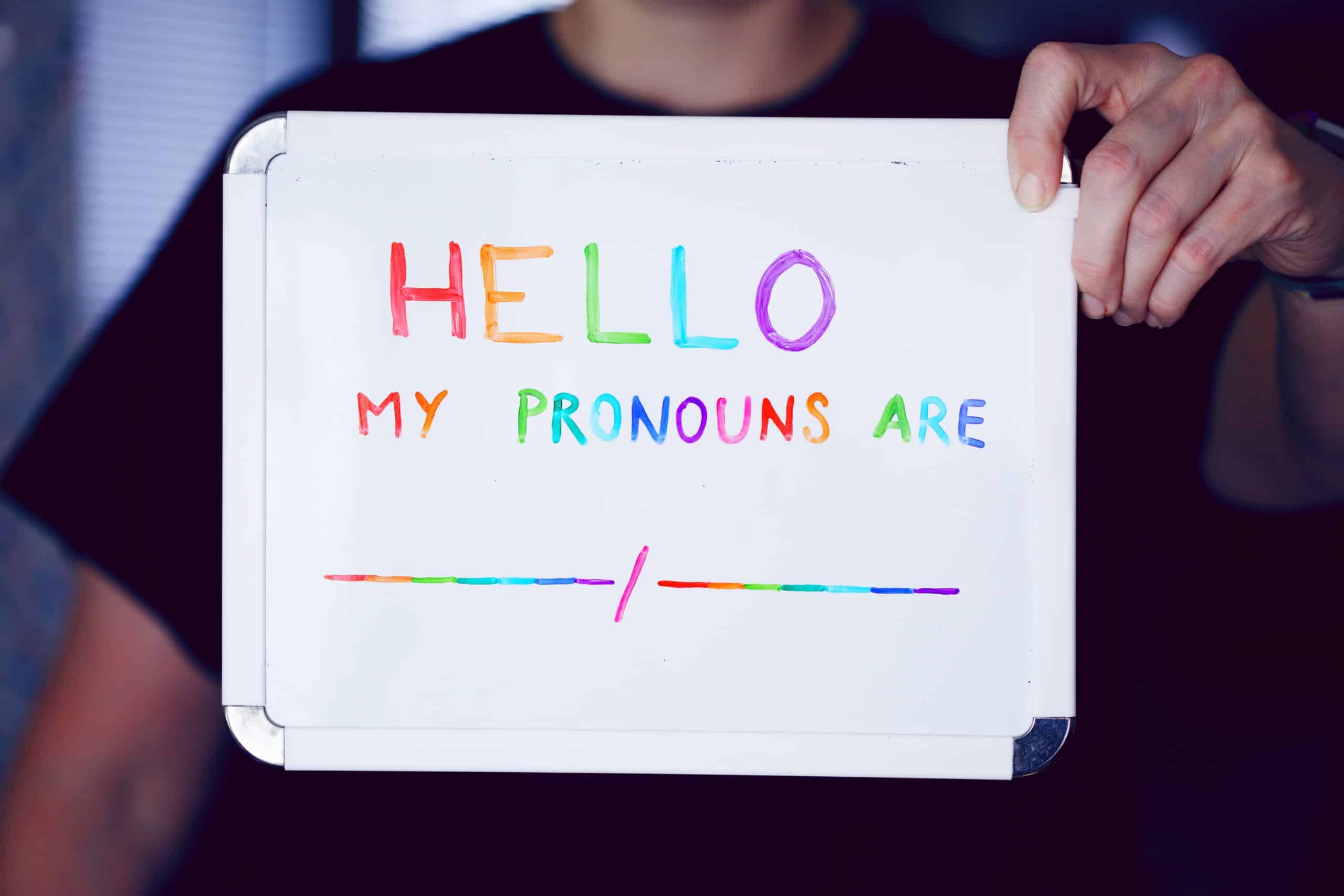Content Warning: This piece contains language regarding suicide, self-harm, bullying, and trauma.
In June 2021, my friend Caroline posted a story on her Instagram with encouragement to add pronouns to one’s profile, as well as instructions on how to do so. I responded with the hands clapping emoji in support. She promptly replied, “So when are you going to do it?”
I paused to consider. How would people respond? In my most immediate circles, many folks would likely approve in a passive way or not consider it much further. In much broader spaces, I knew some would laud or criticize my faith, call for my expulsion from the Jesuits, or announce my eternal damnation.
As I prayed about all of these things, one returning matter kept coming to my heart: What are the needs of my former high school students? And on any given day, the most important things they needed from me were care, empathy, and love. With that in mind, I decided to add pronouns to my various social media and professional bios/names. My discernment to share my pronouns centered on three reasons, which I want to share with those who are considering doing the same.
To support transgender youth
In the U.S., all youth are constantly bombarded with messaging about their self-worth. Whether it be advertisements, social media, or bullying, there’s a deluge of content telling youth that they are not worthy of love and often not worthy of life. This messaging is especially acute for LGBTQ+ youth. According to a study from the National Institute of Health, at least 41% of transgender persons attempt suicide at least once in their life. Transgender and nonbinary youth have even higher rates of self-harm than adults.
I spent over fifteen years regularly struggling with suicidal thoughts and semi-regular ideation, largely stemming from bullying and doubting my self-worth. It is a hell that no person–let alone a child–should have to go through. It is my sacred duty as a Jesuit brother to care for and serve the vulnerable.
To dispel anti-trans myths
Proliferated via the internet and infotainment outlets, there has been an explosion in the last several years of myths about LGBTQ+ persons, especially transgender persons. These myths range from worries that men just want to win women’s athletic competitions, to ahistorical claims that being transgender is just a fad, to truly insidious and dangerous lies about grooming children. We have a responsibility to pursue truth.
While some myths have emerged simply from a lack of understanding, many more are the result of groups and individuals fostering hate and bigotry. As a Jesuit, I have a responsibility to pursue truth in the factual sense and Truth in the theological sense. Myths and scare tactics have no place in that pursuit.
Being transgender is not a sin. Being transgender is not new or a fad. While the precise language or our understanding may have changed (as language so often does), there is historical evidence of transgender or gender non-conforming persons dating back centuries.
To combat hate crimes and hate legislation
These myths have been used to pursue and enact hateful violence and legislation. Commentator Michael Knowles recently stated that “transgenderism must be eradicated from public life entirely — the whole preposterous ideology, at every level.” Knowles falsely believes that to be transgender is an ideology. Even more dangerously, however, he’s equating people to an -ism. When we reduce individuals and communities to an -ism or an “other,” it is easy to attack or harm them. It’s a tactic we have seen throughout history, particularly in the last century. It is language meant to deliver a high, and that high can only be satisfied by increasingly dangerous rhetoric. Indeed, Fr. James Altman recently stated that if any teacher or official is sharing positive views of transgender persons, we should “crush them like vermin.” Pope Francis instead states, “I have always distinguished between what is pastoral [ministry] to persons who have different sexual orientations and that which is the ideology of gender. These are two different things.”
***
So how does sharing one’s pronouns on social media actually accomplish these tasks?
Adding my gender pronouns to my profile is virtue signaling. I fully embrace that! We often use virtue signaling as a derogatory and mocking term. But I’d like to challenge that. We signal our virtues all the time by the clothes we wear, the language we use, and even where we spend money. I have a t-shirt that I regularly wear to the gym that has a picture of Saint Joseph the Worker and says, “Work hard, pray hard.” Prayer and hard work are important virtues to me.
Yet, Jesus makes it pretty clear throughout the Gospels that flaunting one’s virtue is not only insufficient, but it’s also sinful. Virtue signaling alone is self-aggrandizing and makes the issue about oneself rather than a community. But what I’m aiming to do is more akin to a sign out front of a church with God’s message of love. The sign welcomes people in–it’s not the end of the work. Adding pronouns to my bio is not the end, but it’s a sign out front.
As a teacher, my room was plastered in art (mostly student-made)–art in which they saw/shared themselves, their values, and their communities–to show my students that they could talk to me and honestly be themselves; or if they weren’t comfortable opening up to me, that I could at least find them someone they were comfortable talking to. My vocation is to help people know that God absolutely, fundamentally loves them and that I do as well. I don’t have a classroom full of art online, but I can at least in a small way indicate God’s immense love.
By having both my Jesuit initials (“S.J.”) and my pronouns in my profile, I’m attempting to signal some clear messages. To LGBTQ+ persons, I’m stating that I will respect your preferred pronouns and that you can talk to me about spirituality and being an LGBTQ+ person. I’m trying to signal that I am both very committedly religious and someone safe to talk to. I’m signaling that I have a baseline understanding of what it might mean to be transgender. It’s also an attempt to make sharing one’s preferred pronouns not so isolating. To the broader community, I’m indicating that you can ask questions. Given the amount of misinformation out there, I’m attempting to show that I can provide some basic resources. At the same time, I’m indicating that I will not abide hateful rhetoric.
I know for a fact that being vocally and visibly loving of LGBTQ+ persons–including by priests and religious–has helped to save lives and to draw people closer to Christ. Adding pronouns to one’s profile is certainly not the only way and perhaps not even the best way to help transgender people. Indeed, in chatting with some transgender acquaintances, they suggested that sharing pronouns was not the best route, and I should pursue other ways of being a visible ally. In some minds, the question of pronouns becomes a niche focus that distracts from engaging in broader LGBTQ+ ministries. It’s a critique I take to heart and often pray about. Whatever the best route, offering oneself as a presence of God’s work and mercy in the world is vital, and we should not hesitate to announce the good news.
Photo by Alexander Grey


